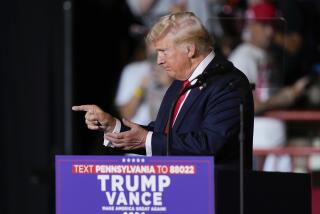Trump’s WeChat ban is on hold after judge grants preliminary injunction

The Trump administration’s effort to ban the Chinese messaging app WeChat is on hold after a U.S. District Court judge granted a preliminary injunction Saturday.
After days of hearings, U.S. Magistrate Judge Laurel Beeler in San Francisco issued an order halting the Commerce Department from implementing restrictions that would remove WeChat and any updates to it from U.S. app stores and prevent U.S. users from sending or receiving money through the app.
In an Aug. 6 executive order targeting WeChat and the video app TikTok, President Trump warned that Chinese software poses a national security threat. The executive order had been set to go into effect Sunday.
Last month, a group called the U.S. WeChat Users Alliance sued over Trump’s executive order barring transactions with the app. It argued the administration’s action would upend life among Chinese enclaves across the U.S. Because most other foreign apps are blocked in China, WeChat is a lifeline for families reaching their relatives abroad as well as a crucial tool for regional and cross-border commerce.
The plaintiffs said Trump’s executive order should be struck down because it restricts their right to free speech and vaguely defines what constitutes a “transaction.”
“The plaintiffs have shown serious questions going to the merits of their First Amendment claim that the secretary’s prohibited transactions effectively eliminate the plaintiffs’ key platform for communication, slow or eliminate discourse, and are the equivalent of censorship of speech or a prior restraint on it,” Beeler’s order reads.
U.S. attorney Serena Orloff argued at a Friday hearing that the ban did not pose a threat to free speech because alternative apps exist.
Beeler said the defense failed to show clear justification for a ban on national-security grounds.
“Certainly the government’s overarching national-security interest is significant,” she wrote. “But on this record — while the government has established that China’s activities raise significant national security concerns — it has put in scant little evidence that its effective ban of WeChat for all U.S. users addresses those concerns.”
In a hearing last week, Beeler said she was willing to grant a preliminary injunction because the order was vague and ill-defined. She said she was sympathetic to the anxiety it creates for people who rely on the app.
At the Friday hearing, Beeler declined to issue a preliminary injunction. She said that while she had planned to block the WeChat ban, new details from the Commerce Department issued that morning changed the “fact landscape” and clarified effects of the order. She heard arguments Saturday before issuing her order.
The Trump administration could appeal the ruling.
WeChat, owned by Chinese tech giant Tencent Holdings Ltd., is China’s most popular mobile app. It counts more than 1.2 billion monthly users worldwide and 19 million daily active users, according to data firm Apptopia.
“The United States has never shut down a major platform for communications, not even during war times,” Michael Bien, co-counsel for U.S. WeChat Users Alliance, said in a statement. “There are serious First Amendment problems with the WeChat ban, which targets the Chinese American community and trampled on their First Amendment guaranteed freedoms to speak, to worship, to read and react to the press, and to organize and associate for numerous purposes.”
Amid a trade war with China, the Trump administration has threatened to ban TikTok unless its Chinese owner, ByteDance, divests U.S. operations. Trump on Saturday gave his blessing to the framework of a deal in which Oracle and Walmart would acquire stakes in TikTok.








